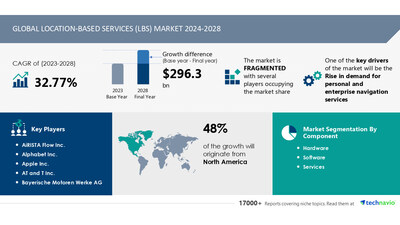NEW YORK, Oct. 19, 2024 /PRNewswire/ — Report on how AI is driving market transformation – The Global Location-Based Services (LBS) Market size is estimated to grow by USD 296.3 billion from 2024-2028, according to Technavio. The market is estimated to grow at a CAGR of 32.77% during the forecast period. Rise in demand for personal and enterprise navigation services is driving market growth, with a trend towards growing popularity of location-based gaming. However, privacy and security issues in location-based services poses a challenge – Key market players include AiRISTA Flow Inc., Alphabet Inc., Apple Inc., AT and T Inc., Bayerische Motoren Werke AG, Cisco Systems Inc., Emanate Wireless, Esri Global Inc., Foursquare Labs Inc., General Electric Co., Halma Plc, Hewlett Packard Enterprise Co., International Business Machines Corp., Microsoft Corp., Oracle Corp., Qualcomm Inc., Siemens AG, Telefonaktiebolaget LM Ericsson, Zebra Technologies Corp., and Ziff Davis Inc..
AI-Powered Market Evolution Insights. Our comprehensive market report ready with the latest trends, growth opportunities, and strategic analysis- View your snapshot now
|
Forecast period |
2024-2028 |
|
Base Year |
2023 |
|
Historic Data |
2018 – 2022 |
|
Segment Covered |
Component (Hardware, Software, and Services), Type (Outdoor and Indoor), and Geography (North America, Europe, APAC, South America, and Middle East and Africa) |
|
Region Covered |
North America, Europe, APAC, South America, and Middle East and Africa |
|
Key companies profiled |
AiRISTA Flow Inc., Alphabet Inc., Apple Inc., AT and T Inc., Bayerische Motoren Werke AG, Cisco Systems Inc., Emanate Wireless, Esri Global Inc., Foursquare Labs Inc., General Electric Co., Halma Plc, Hewlett Packard Enterprise Co., International Business Machines Corp., Microsoft Corp., Oracle Corp., Qualcomm Inc., Siemens AG, Telefonaktiebolaget LM Ericsson, Zebra Technologies Corp., and Ziff Davis Inc. |
Key Market Trends Fueling Growth
The location-based gaming industry is experiencing significant growth due to the widespread availability of high-speed Internet and smartphones equipped with positioning technologies like GPS. This has given rise to interactive map-based mobile games such as Ingress, Pokemon Go, and Geocaching, where players’ physical locations determine their in-game progress. The gaming industry’s shift towards an as-a-service model, fueled by technologies such as cloud computing, 5G, and virtual reality (VR), has led to the emergence of new gaming models like online multiplayer and free-roam games. Game developers are leveraging location analytics tools to monitor player movements and create games based on real-world locations. For instance, Bublar Group AB’s Hello Kitty AR: Kawaii World and Ludare Games Group Inc.’s Men in Black: Global Invasion are location-based AR games that merge digital content with real-world locations. The increasing popularity of these games is expected to boost the adoption of location-based services among game developers, driving the growth of the global location-based services market.
Location-based services (LBS) are on the rise, with mobile positioning at the forefront. Satellite-based GPS, such as Global Positioning System (GPS), leads the way, but hybrid technologies like E-OTD, OTDOA, Wireless-assisted GNSS, A-GNSS, and 5G infrastructure are gaining ground. LBS trends include smart city projects, 3D mapping applications, e-commerce, mobile apps, and real-time location tracking using Bluetooth beacons. Navigation and tracking, transportation and logistics, healthcare, and fleet management are major industries benefiting from LBS. Indoor location services, real-time data, and business intelligence are also key areas of growth. Hardware and software innovations, such as artificial intelligence, augmented reality (AR), and virtual reality (VR), are transforming LBS, with applications in disaster information systems, autonomous vehicles, and social media. Geolocation data, IoT, and connected devices are integral to the LBS ecosystem. Food delivery services and local search are other emerging sectors. Overall, LBS is a dynamic and evolving market, offering numerous opportunities for businesses.
Insights on how AI is driving innovation, efficiency, and market growth- Request Sample!
Market Challenges
- Location-Based Services (LBS) market involves the exchange of personal information between end-users and various players in the value chain. This data, including location, visits, people met, and events attended, can be obtained without consent and misused. Network providers manage and own the databases, granting them access to users’ location-based information. Regulations such as the EU’s General Data Protection Regulation (GDPR) require companies to handle personal data responsibly, ensuring data privacy and legal use. Compliance with regional and global regulations is essential for collecting and using location-based data. Companies must take responsibility for controlling the distribution and use of customer location information. Privacy and security concerns may hinder the growth of the global LBS market.
- Location-Based Services (LBS) market is experiencing significant growth due to the increasing use of connected devices, GPS, and IoT technology. Autonomous vehicles and disaster information systems are new applications driving demand. Real-time data from positioning technologies like GPS and 5G infrastructure enable navigation services, indoor location services, and transportation and logistics. In healthcare, LBS is used for patient tracking and emergency response. Businesses use LBS for fleet management, local search, and real-time data analysis. Hardware and software solutions include AR and VR for navigation and 3D mapping. Food delivery services and social media also leverage LBS. Challenges include ensuring accuracy and security of geolocation data, and integrating with navigation and tracking systems. Overall, LBS offers valuable opportunities for businesses in various industries.
Insights into how AI is reshaping industries and driving growth- Download a Sample Report
Segment Overview
This location-based services (lbs) market report extensively covers market segmentation by
- Component
- 1.1 Hardware
- 1.2 Software
- 1.3 Services
- Type
- 2.1 Outdoor
- 2.2 Indoor
- Geography
- 3.1 North America
- 3.2 Europe
- 3.3 APAC
- 3.4 South America
- 3.5 Middle East and Africa
1.1 Hardware- The Location-Based Services (LBS) market continues to grow, offering businesses valuable opportunities to connect with consumers based on their geographic location. LBS enables targeted advertising, improved customer experiences, and efficient logistics. Companies like Google Maps, Uber, and Starbucks successfully leverage LBS to enhance their offerings and gain a competitive edge. The market is expected to expand further due to increasing smartphone usage and the integration of IoT devices.
Download complimentary Sample Report to gain insights into AI’s impact on market dynamics, emerging trends, and future opportunities- including forecast (2024-2028) and historic data (2018 – 2022)
Research Analysis
Location-based services (LBS) refer to technologies and applications that use geographic location information to enhance and personalize user experiences. Mobile positioning, such as Satellite-based GPS, E-OTD (Enhanced Observed Time Difference), OTDOA (Observed Time Difference Of Arrival), Wireless-assisted GNSS (Global Navigation Satellite System), A-GNSS (Assisted Global Navigation Satellite System), and hybrid technologies, enable real-time data acquisition. LBS applications include smart city projects, 3D mapping, geolocation data, and navigation services. Connected devices like smartphones, IoT (Internet of Things), and wearables leverage LBS for location-based services, social media check-ins, and augmented reality (AR) and virtual reality (VR) experiences. Geographic location data is essential for these applications, providing context and enhancing user engagement. Positioning technologies continue to evolve, offering more accurate and efficient solutions for LBS applications.
Market Research Overview
Location-based services (LBS) refer to technologies and applications that use mobile positioning and real-time data to provide customized information and services based on a user’s location. These services can be delivered through satellite-based GPS, such as Global Positioning System (GPS), or through hybrid technologies like Enhanced Observed Time Difference (E-OTD), Time Difference of Arrival (TDOA), Wireless-assisted Global Navigation Satellite Systems (GNSS), and Assisted-Global Navigation Satellite Systems (A-GNSS). LBS are used in various industries, including smart city projects, transportation and logistics, healthcare, and e-commerce, among others. They enable real-time location tracking, navigation and tracking, indoor location services, and geolocation data for connected devices, autonomous vehicles, disaster information systems, and more. LBS are also integrated with IoT technology, social media, and mobile apps, and are used for 3D mapping, augmented reality (AR), and virtual reality (VR) applications. With the advent of 5G infrastructure, LBS are expected to become even more advanced and integrated into our daily lives.
Table of Contents:
1 Executive Summary
2 Market Landscape
3 Market Sizing
4 Historic Market Size
5 Five Forces Analysis
6 Market Segmentation
- Component
- Hardware
- Software
- Services
- Type
- Outdoor
- Indoor
- Geography
- North America
- Europe
- APAC
- South America
- Middle East And Africa
7 Customer Landscape
8 Geographic Landscape
9 Drivers, Challenges, and Trends
10 Company Landscape
11 Company Analysis
12 Appendix
About Technavio
Technavio is a leading global technology research and advisory company. Their research and analysis focuses on emerging market trends and provides actionable insights to help businesses identify market opportunities and develop effective strategies to optimize their market positions.
With over 500 specialized analysts, Technavio’s report library consists of more than 17,000 reports and counting, covering 800 technologies, spanning across 50 countries. Their client base consists of enterprises of all sizes, including more than 100 Fortune 500 companies. This growing client base relies on Technavio’s comprehensive coverage, extensive research, and actionable market insights to identify opportunities in existing and potential markets and assess their competitive positions within changing market scenarios.
Contacts
Technavio Research
Jesse Maida
Media & Marketing Executive
US: +1 844 364 1100
UK: +44 203 893 3200
Email: media@technavio.com
Website: www.technavio.com/
![]() View original content to download multimedia:https://www.prnewswire.com/news-releases/location-based-services-lbs-market-to-grow-by-usd-296-3-billion-from-2024-2028–driven-by-demand-for-personal-and-enterprise-navigation-with-ai-powering-market-evolution—technavio-302280323.html
View original content to download multimedia:https://www.prnewswire.com/news-releases/location-based-services-lbs-market-to-grow-by-usd-296-3-billion-from-2024-2028–driven-by-demand-for-personal-and-enterprise-navigation-with-ai-powering-market-evolution—technavio-302280323.html
SOURCE Technavio

Featured Image: DepositPhotos @ Antonmatyukha








